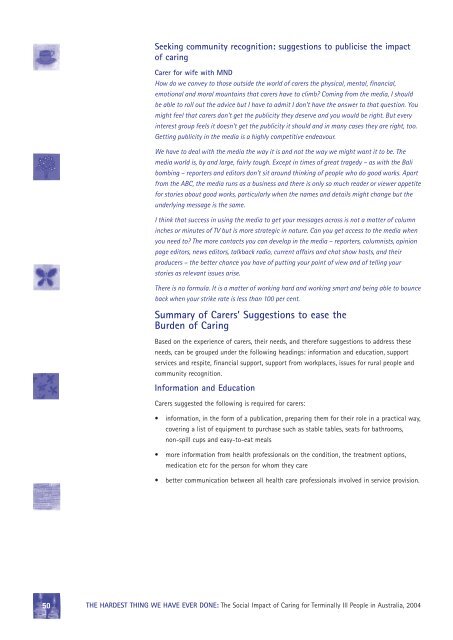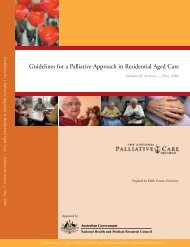The hardest thing we have ever done - Palliative Care Australia
The hardest thing we have ever done - Palliative Care Australia
The hardest thing we have ever done - Palliative Care Australia
You also want an ePaper? Increase the reach of your titles
YUMPU automatically turns print PDFs into web optimized ePapers that Google loves.
Seeking community recognition: suggestions to publicise the impact<br />
of caring<br />
<strong>Care</strong>r for wife with MND<br />
How do <strong>we</strong> convey to those outside the world of carers the physical, mental, financial,<br />
emotional and moral mountains that carers <strong>have</strong> to climb? Coming from the media, I should<br />
be able to roll out the advice but I <strong>have</strong> to admit I don’t <strong>have</strong> the ans<strong>we</strong>r to that question. You<br />
might feel that carers don’t get the publicity they deserve and you would be right. But <strong>ever</strong>y<br />
interest group feels it doesn’t get the publicity it should and in many cases they are right, too.<br />
Getting publicity in the media is a highly competitive endeavour.<br />
We <strong>have</strong> to deal with the media the way it is and not the way <strong>we</strong> might want it to be. <strong>The</strong><br />
media world is, by and large, fairly tough. Except in times of great tragedy – as with the Bali<br />
bombing – reporters and editors don’t sit around thinking of people who do good works. Apart<br />
from the ABC, the media runs as a business and there is only so much reader or vie<strong>we</strong>r appetite<br />
for stories about good works, particularly when the names and details might change but the<br />
underlying message is the same.<br />
I think that success in using the media to get your messages across is not a matter of column<br />
inches or minutes of TV but is more strategic in nature. Can you get access to the media when<br />
you need to? <strong>The</strong> more contacts you can develop in the media – reporters, columnists, opinion<br />
page editors, news editors, talkback radio, current affairs and chat show hosts, and their<br />
producers – the better chance you <strong>have</strong> of putting your point of view and of telling your<br />
stories as relevant issues arise.<br />
<strong>The</strong>re is no formula. It is a matter of working hard and working smart and being able to bounce<br />
back when your strike rate is less than 100 per cent.<br />
Summary of <strong>Care</strong>rs’ Suggestions to ease the<br />
Burden of Caring<br />
Based on the experience of carers, their needs, and therefore suggestions to address these<br />
needs, can be grouped under the following headings: information and education, support<br />
services and respite, financial support, support from workplaces, issues for rural people and<br />
community recognition.<br />
Information and Education<br />
<strong>Care</strong>rs suggested the following is required for carers:<br />
• information, in the form of a publication, preparing them for their role in a practical way,<br />
covering a list of equipment to purchase such as stable tables, seats for bathrooms,<br />
non-spill cups and easy-to-eat meals<br />
• more information from health professionals on the condition, the treatment options,<br />
medication etc for the person for whom they care<br />
• better communication bet<strong>we</strong>en all health care professionals involved in service provision.<br />
50 THE HARDEST THING WE HAVE EVER DONE: <strong>The</strong> Social Impact of Caring for Terminally Ill People in <strong>Australia</strong>, 2004
















